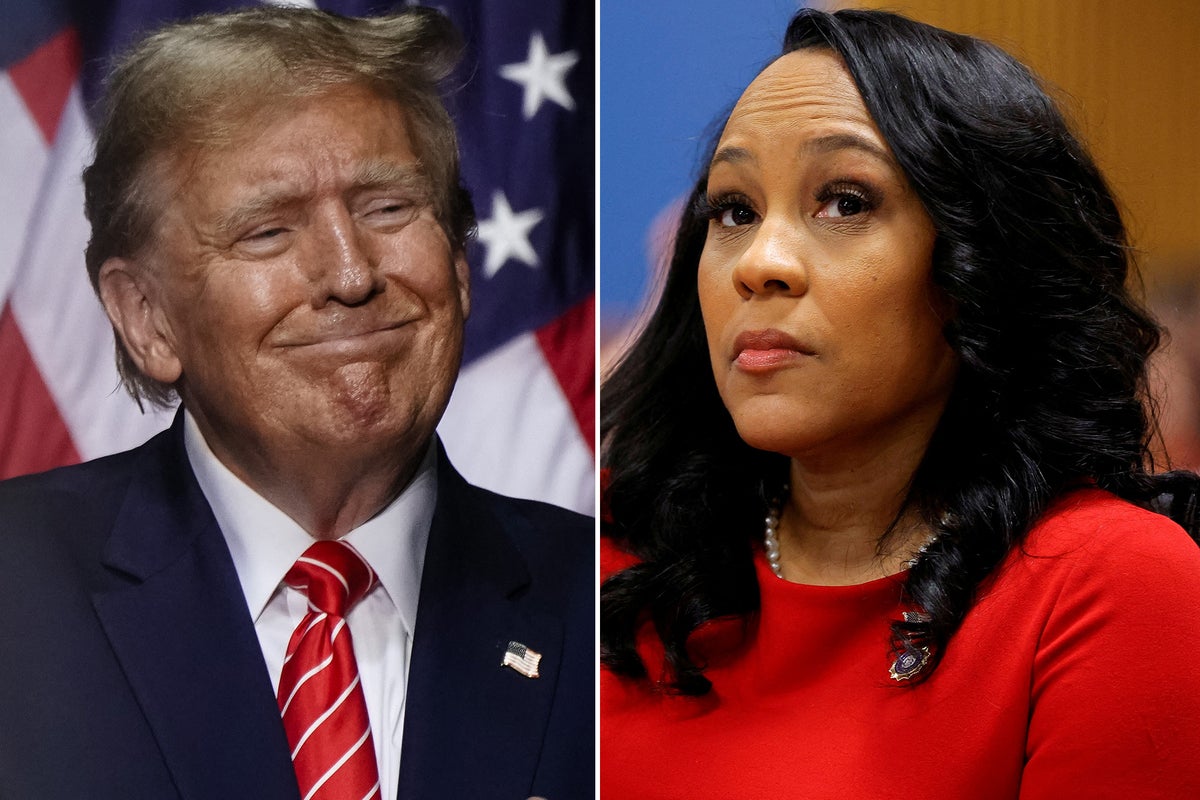
Georgia’s highest court rejected an appeal from Fulton County District Attorney Fani Willis in her efforts to return to her sprawling election interference case against Donald Trump after she was disqualified from the blockbuster criminal investigation last year.
Tuesday’s split decision from the Georgia Supreme Court is a substantial victory for Trump and his allies, who are accused of leading a “criminal enterprise” to overturn the state’s election results in 2020.
The fate of the last-remaining criminal investigation against the president now remains unclear after sitting dormant for months.
Trump avoided a jail sentence after a jury in New York found him guilty on 34 counts of fraud last year, and now-former special counsel Jack Smith dropped two federal indictments against Trump for his attempts to overturn election results and withhold classified documents.
After celebrating the ruling on Truth Social, Trump called prosecutors who investigated his attempts to overturn election results “CRIMINALS” who “will hopefully pay serious consequences for their illegal actions.”
Those cases against him “should now be dead for good,” he said.
“They went after their Political Opponent at levels never seen before, and LOST,” he wrote. “They are now CRIMINALS who will hopefully pay serious consequences for their illegal actions. Our Country was dead a year ago, in large part because of the illegal Weaponization of the American Justice System by the Radical Left Democrats. As we end illegal Political Lawfare, the U.S.A. is BACK now, bigger and better than ever before.”
Speaking outside the White House, Trump told reporters he thinks Willis “should be in jail.”
Last year, following several days of hearings on Trump’s allegations that Willis financially benefited from the case by hiring outside prosecutor Nathan Wade, with whom she was once romantically involved, the judge presiding over the case determined that one of them should step aside.
Wade then submitted his resignation.
Trump and his co-defendants appealed, arguing that “nothing in the law — anywhere — says that the remedy for an appearance of impropriety is the disqualification of one apparently conflicted lawyer but not another.”
Lawyers for Willis argued that the allegations against her relied on salacious rumours, gossip and innuendo designed to “embarrass and harass” her, all while indefinitely delaying the criminal case against Trump and his allies.
In December, a panel of Republican-appointed judges on a state appeals court determined Willis’s hiring of Wade amounted to a “significant” conflict of interest that warranted her dismissal from the prosecution team.
The court, however, did not agree to the former president’s “extreme” argument to dismiss the case altogether — potentially leaving the case up to another prosecutor to take one.
“No Georgia court has ever disqualified a district attorney for the mere appearance of impropriety without the existence of an actual conflict of interest,” Willis’ legal team told the state’s Supreme Court. “And no Georgia court has ever reversed a trial court’s order declining to disqualify a prosecutor based solely on an appearance of impropriety.”
The Prosecuting Attorneys’ Council of Georgia, a state entity with a Republican director, will now decide whether to reassign the case, and to whom.
If the case remains standing with a new prosecutor in charge, Trump is not expected to face a trial until his term ends in 2029.
His 14 co-defendants, however, could be tried sooner.
The case brought by the district attorney in 2023 accuses the former president and his co-defendants of relying on a so-called “fake elector” scheme to falsely assert his victory, seizing voting machines, intimidating election workers, and pushing the state’s top election official to “find” votes he would need to win.
Trump and more than a dozen co-defendants — including allies Mark Meadows, Rudy Giuliani, Jeffrey Clark and John Eastman — were charged under the state’s version of the RICO Act, typically used to break up organized crime rings.
They also faced a long list of other charges tied to an alleged scheme to subvert the state’s election results.
Four of Trump’s original co-defendants — including attorneys Kenneth Chesebro, Jenna Ellis and Sidney Powell — have already pleaded guilty to some charges after reaching deals with prosecutors.
“While I disagree with the decision of the Georgia Court of Appeals and the Georgia Supreme Court’s divided decision not to review it, I respect the legal process and the courts,” Willis said in a statement Tuesday.
“Accordingly, my office will make the case file and evidence available to the Prosecuting Attorneys’ Council for use in the ongoing litigation,” she added. “I hope that whoever is assigned to handle the case will have the courage to do what the evidence and the law demand.”
While Trump rages against what he considers “illegal Political Lawfare” from his opponents, the president and his administration have launched a barrage of investigations, lawsuits, mass firings, and threats of prosecution against Democratic lawmakers, news outlets and federal officials, including the lawyers representing them.
And within the last week, following the killing of right-wing activist Charlie Kirk, the president has suggested using the case to prosecute left-wing groups aligned with Democratic figures, including a campaign cracking down on protected speech.
